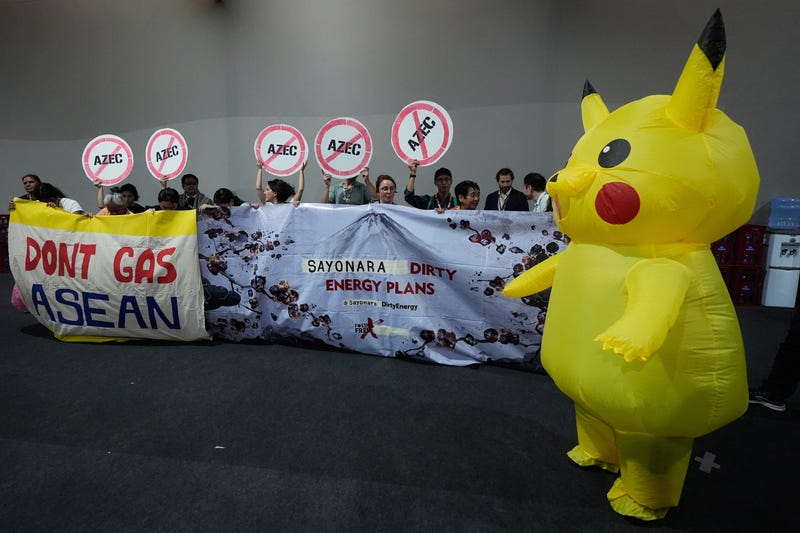
BELEM, Brazil (AP) — Protesters in Pokemon costumes stomped around the United Nations climate conference on Friday to send a message to Japan: end financing of coal and natural gas projects across Southeast Asia and other regions of the Global South.
The Stop Japan's Dirty Energy Plans protest aligned with the first of two thematic days with a focus on energy during the annual climate conference known as COP30, held this year in Belem on the edge of the Brazilian Amazon. Organizers of the protest said the investments are a major blind spot for Japan, typically a regional voice in climate negotiations that often touts itself as a decarbonization leader in Asia.
“Japan is actually delaying the fossil fuel phase-out across Asia” by funding energy projects, mainly liquefied natural gas developments, in countries such as Thailand, Malaysia, Indonesia and the Philippines, said Hiroki Osada with Friends of the Earth Japan, one of the protest organizers.
“It’s so important for our Global South comrades to voice their concerns in Belem, so that they can actually demand the Japanese government to do something about this,” he said.
The government-owned Japan Bank for International Cooperation financed $6.4 billion in loans for coal projects and $874 million in loans for gas projects from 2016 to 2024, according to a 2025 study by the Philippines-based research and advocacy organization Center for Energy, Ecology and Development based on public government and banking data. The bank, which is Japan’s major conduit of overseas aid, did not respond to requests for comment.
The Japan Delegation at COP30 responded to The Associated Press but declined to directly comment on the claims made by activists. Instead, Japanese officials said Japan's cooperation with Southeast Asian nations to achieve “decarbonization, economic growth and energy security simultaneously through varies pathways” was supported by those countries.
A pair of bobbing Pikachus
The protest centered on a pair of people wearing life-sized, inflatable Pikachu costumes who flanked a handful of activists.
The event included activists from across the Association of Southeast Asian Nations (ASEAN), which is home to multiple Japan-backed fossil fuel projects. One banner read: “Don’t gas ASEAN.” Ian Rivera, national coordinator at Philippine Movement for Climate Justice, led chants of “Only Pokemon, no fossil fuels” and “Sayonara fossil fuels.”
The bobbing Pikachus later visited the country pavilions of India, Indonesia and Malaysia to “to reveal how Japan is exporting its fossil agenda.”
“If Global North countries, like Japan, decide to double down on fossil fuel production and export, that is going to make it impossible for countries across the Global South to make the just energy transition,” said Amiera Sawas, head of research and policy at the Fossil Fuel Non Proliferation Treaty Initiative.
The Pikachu protest, a frequent one during recent summits, was sandwiched between other anti-fossil fuel demonstrations and came after a Friday morning demonstration blocked the main entrance to the conference and increased COP30 security measures. Earlier, activists hosted a “Kick Out the Suits” event demanding the removal of fossil fuel lobbyists, who environmentalists accused of undermining the negotiations.
On Saturday, when significant protests are expected to mark the midpoint of COP, a large march will feature a “funeral for fossil fuels” where giant coffins — symbolizing coal, oil and gas — will be carried down the streets of Belem.
Fossil fuels are key issue at UN climate talk
The global effort to transition away from fossil fuels has been a key topic at COP30. Brazilian President Luiz Inácio Lula da Silva set the tone during the Leader's Summit last week when he called for world leaders to prepare a road map to “overcome dependence on fossil fuels.”
Several countries — such as Denmark, the United Kingdom, Kenya, France and Germany — supported Lula's call to action.
In Dubai during COP28, nearly 200 countries agreed to move away from fossil fuels, the first pledge in decades of U.N. climate talks. But many have warned the deal still had significant shortcomings.
“At COP30, we need an actionable outcome, not another road map to nowhere," said Jasper Inventor, deputy program director with Greenpeace International. “While it’s positive to see progression in Belem, we must ensure that this actually leads towards a clear plan to phase out fossil fuels and one that fast-tracks renewables.”
___
The Associated Press’ climate and environmental coverage receives financial support from multiple private foundations. AP is solely responsible for all content. Find AP’s standards for working with philanthropies, a list of supporters and funded coverage areas at AP.org.
___
This story was produced as part of the 2025 Climate Change Media Partnership, a journalism fellowship organized by Internews’ Earth Journalism Network and the Stanley Center for Peace and Security.